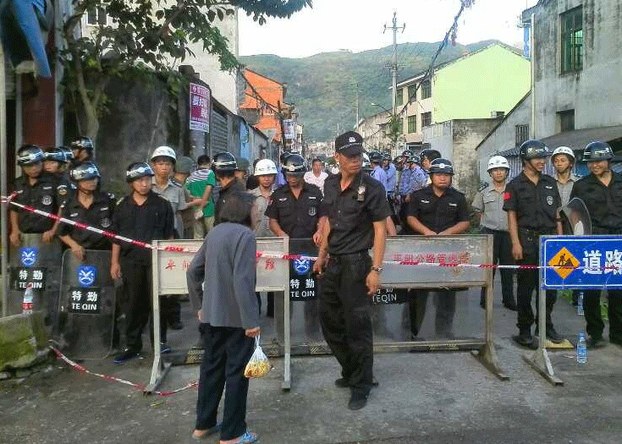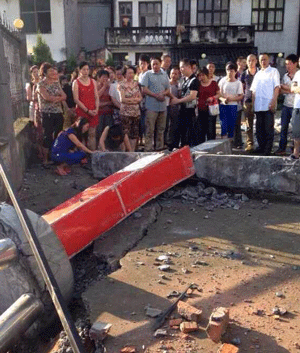




Authorities in the eastern Chinese province of Zhejiang on Thursday dispatched more than 1,000 security personnel to remove a cross from a Christian church building, local Protestants said.
The security guards arrived outside the Guangming Church in Aojiang township near the eastern city of Wenzhou, scuffling with several dozens of its congregants.
Eventually, the authorities beat back the protesters, with a number of injuries reported in the process, and succeeded in bringing down the cross, eyewitnesses said.
"They demolished [it] at about 5.00 to 6.00 p.m.," a Protestant pastor who asked to remain unnamed told RFA on Thursday. "The first time they tried it, they were unsuccessful."
"More than 1,000 people came, because they were afraid that the congregants wouldn't allow them to pull it down," the pastor said.
He said the security guards had met with little resistance, however.
"There weren't many of them; only a few dozen," the pastor said. "There's not much we can do about it now; the government was determined to pull it down."
Most of the security personnel were private security guards, although some riot police also came to the scene, he said.
"They used temporary labor to do it," he said, adding that such a process typically costs the government around 50,000 yuan (U.S.$8,140 ).
Stepped-up campaign

Demolition threats
The demolition of the more visible and ostentatious signs of Christian worship in affluent Wenzhou is part of an ongoing "three reforms and one demolition" political campaign to lower the profile of Protestants in an area where they have more money and visibility than in many other places in China.
Dozens of Christian groups in Zhejiang have received notification that crosses must be taken down from buildings, or face demolition, the U.S.-based Christian rights group ChinaAid said.
Local officials of the ruling Chinese Communist Party are targeting any crosses that are visible from state highways and railway lines, according to local sources.
Last May, more than 50 human rights lawyers, unofficial Protestant house church leaders, and scholars issued a statement calling on Beijing to stop interfering in its citizens' religious affairs.
The statement, issued by Purdue University Center for Religion and Chinese Society in Indiana, said Chinese nationals trying to follow their own religion often experience "misunderstanding, violation, discrimination, and persecution" at the hands of the authorities.
Officially an atheist country, China has an army of officials whose job is to watch over faith-based activities, which have spread rapidly in recent decades amid sweeping economic and social change.
Party officials are put in charge of Catholics, Buddhists, Taoists, Muslims, and Protestants. Judaism isn't recognized, and worship in nonrecognized temples, churches, or mosques is against the law.
Reported by Xin Lin for RFA's Mandarin Service and Wen Yuqing for the Cantonese Service. Translated and written in English by Luisetta Mudie.